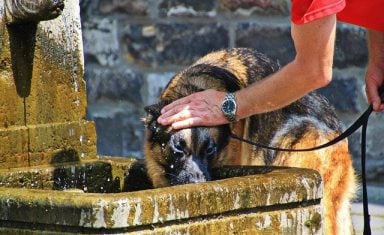Heartworm disease is on the rise in Virginia. Warmer temperatures wet springs lead to a bounty of mosquitos, and mosquitos are the vector by which cats and dogs get infected with heartworm.
Heartworm—caused by Dirofilaria Immitis—is a large worm growing up to 14 inches long. Just like the name implies, it takes up residence in your animal’s heart.
Heartworms do not lay eggs like other worms. The adults mate inside the pulmonary arteries of your canine and then give live birth to larvae. These larvae catch a ride in the dog’s blood stream until they are sucked up by a mosquito looking for a good meal. The larva is only partially mature and will need to go through two molts in the mosquito. Once it reaches the third stage of development, the larvae migrate to the mosquito’s proboscis. As the mosquito takes its next meal, the larvae are deposited on the skin next to the bite site. The larvae migrate into the skin and then lives there for around three months. At the end of the three months, the larvae are ready to enter the circulatory system and develop into an adult. They prefer to migrate and settle out in the pulmonary arteries. As the infection becomes more severe, they also settle in the right atrium of the heart or wherever they can find room.
Heartworm in dogs
In dogs, the heartworm infestation causes severe cardiac changes. First, the pulmonary arteries suffer damage from having the worms inside them. This causes severe inflammation and can even cause the arteries to become dilated and tortuous. This predisposes the infected dog to aneurysms and clots. The clots can lead to infarction or blockage of a blood vessel, in the brain you know this as a stroke. Secondly, the heartworms can cause heart failure.
As the worm burden increases, they block the outflow of the heart thus leading to dilation of the right side of the heart. The heart muscle on the right side thickens, just as your muscles do as you go to the gym. More work equals increased muscle size. The thickened heart muscle causes disturbances in the electrical impulses of the heart. This leads to arrhythmias. Eventually, the heart becomes too distorted to function at all, and the dog goes into right sided heart failure. In severe infections, caval syndrome is observed. In this case there are so many worms that the entire right side of the heart is filled up. This causes severe clinical signs that present acutely. If the worms are not removed surgically once caval syndrome has begun, most dogs die within one to two days.
Heartworm in cats
Yes, cats can get heartworm, too. The parasites infect felines a bit differently. The heartworm has not evolved to live in your cat, therefore it cannot mature in a feline’s body. Most cats only have one or two worms. The worm cannot read the signs to migrate to the correct place in the feline and is lost without its biochemical GPS.
This doesn’t mean heartworms are benign for cats. A cat’s immune system overreacts to the migrating larva, causing all sorts of health issues. The most common signs of feline heartworm infestation are respiratory problems. Often the cat presents with a cough, respiratory distress, and vomiting. The signs are caused the by the cat’s marked inflammatory response to the migrating larva. As the worms die, they can also cause circulatory problems, renal issues, GI issues, and sudden death.
Preventing heartworm
Luckily for our pets, Heartworm is preventable with several medications. A monthly tablet or spot on can prevent your pet from being affected by the debilitating disease. As with most diseases, it is much more cost effective and better for your pet to prevent the disease rather than treat it. Heartgard, Interceptor, Revolution, and Advantage Multi all prevent heartworm infestation. That said there are several ways to treat your pet if it has been diagnosed with heartworm. Cats are treated with immune-depressing drugs to prevent inflammation. If the cat is not sick, most vets recommend waiting 2-3 years for your cat to clear the infection itself. Treatment with immiticide is not recommended as it can cause an embolic event in felines. Dogs are a different story. First dogs are treated with monthly preventative to eliminate the immature heartworm larvae. Secondly, an immiticide is used to kill the adult worms. There is some controversy with this so seek the advice of your veterinarian as how best to proceed. In severe cases, surgery can be utilized to go in and pull the worms out by way of the jugular vein. This is a complicated procedure.
Once again, the best treatment is prevention!!
Consider keeping your dog or cat on a monthly preventative. The treatment regimes for a heartworm infestation are very expensive and time consuming. Testing for heartworm should be performed yearly even if your dog is on a preventative.
For more information visit the American Heartworm Society at HeartWormSociety.org.
For more information, contact our team at VETSS!



